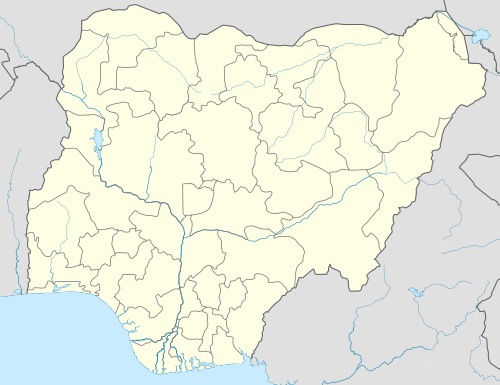Ikare
Ikare is a city in the northern part of Ondo State, Nigeria.
Ikare-Akoko | |
|---|---|
| Motto(s): omo olókè méjì tako tabo | |
 Ikare-Akoko | |
| Coordinates: 7°31′N 5°45′E | |
| Demonym(s) | omo Ikare |
Ikare-Akoko (Ikare for short), city in southwestern Nigeria, is located in the Northern District of Ondo State. Ikare is about 100;km from Akure, the Ondo State capital. The city was the divisional headquarters of the old Akoko Division, comprising Oka-Akoko, Isua-Akoko, Okeagbe-Akoko etc. Based on the Local Government System now practised in Nigeria, the city is currently the headquarters of Akoko North-East Local Government. The city is a trading point for the production of Cocoa in the surrounding area
The Olukare of Ikare Oba Alhaji Akadiri Saliu Momoh 1V JP CON . Paramount ruler and Prescribe authority of Ikare and Akoko North East.
For administrative convenience Oba Momoh divided Ikare into five administrative quarters each headed by a High Chief.
The quarters, components and Heads are:
- Ikaado:Okela,Odo,Iyame&Eshe _High Chief Elemeje Okela.
- Ilepa: Ilepa and Oyinmo_High Chief Ofua.
- Iyometa:Okegbe,Iku&Okorun_High Chief Ale_S K A Adegbite.
- Igbede:Igbede,Edo,Ekan,Ishakunmi_High Chief Eledo.
- Oorun:Okoja,Odeyare,Odoruwa&Okeruwa_HighChief Oloruun.
Note: the present holder of the title High Chief Ale was installed as a Chief by the late Olukares of Ikare Oba Amusa Momoh III in 1972 in Olukare's palace, he was a regent for nine years after the demise of Oba Amusa Momoh III in 1976. Wonder how a regent in Yoruba would suddenly become an Oba, a taboo.
Oja Oba is situated in front of Olukare's palace as in other Yoruba ancient towns.
The city is located in the Yoruba cultural region and has a substantial Christian, Jehovah Witness and Muslim population with several Churches, worshiping halls and Mosques. The architectural style of the city incorporates both Portuguese and Arabic styles. The Portuguese style was introduced in the 16th century when Portugal began to export slaves from the region. Arabic influences were incorporated in the 19th century with the diffusion of Islamic culture Southward across the Sahara. Population as of 2006 was over 700,000.
Education
Ikare is home to several educational institutions in Ondo State. Notable among which are; Ondo State College of Art and Science {now Federal Technical College, Ikare}; Victory College Ikare; Citadel International College, Ikare; Comprehensive high School,Ikare; Greater Tomorrow Primary School and so many government and private-owned Primary and Secondary Schools. Ikare sons and daughters are well educated and are presently holding national and international positions.
Markets
Ikare is a chief commercial city in Ondo state with several industrial base and markets which include; Oja-Oba Market, Okore Market, Osele Market, Jubilee Market, and several other markets in adjoining Villages. It is a super city for successful transportation business especially by private individuals.
Inter Ethnic Relationships
Ikare though basically a Yoruba ethnic city, is also a place of convergence in Ondo State for many ethnic groups in Nigeria namely Igbo, Hausa, Fulani, Ijaw,and so on. The friendly disposition of its natives to visitors and holiday makers, from time immemorial, is perhaps responsible for the growing number of settlers in the city.
Festival
Ikare has a rich cultural heritage with exciting festivals every year. The popular new yam festival is the chief festival in Ikare which is celebrated every June 20. On this day, Ikare sons and daughters both home and abroad come together to celebrate what is usually termed the starting point of a new year for Ikare land. The festival also features Masquerade parade, such as Oke, Seeru, GanGan among others. There is also the Aringiya Festival (Maiden Festival)where virgin will paint themselves with Osun (Camwood) and go around the town nude, before converging at a designated point. However, Islamic festivals such as Eid-Maulud, Eid Fitr, Eid Kabir as well as Christian festivals such as Christmas, Easter and also the New Year Festival celebrated on every first day of January had almost overshadowed the Cultural Festivals. All these point to the fact that Ikare is a very religious city.